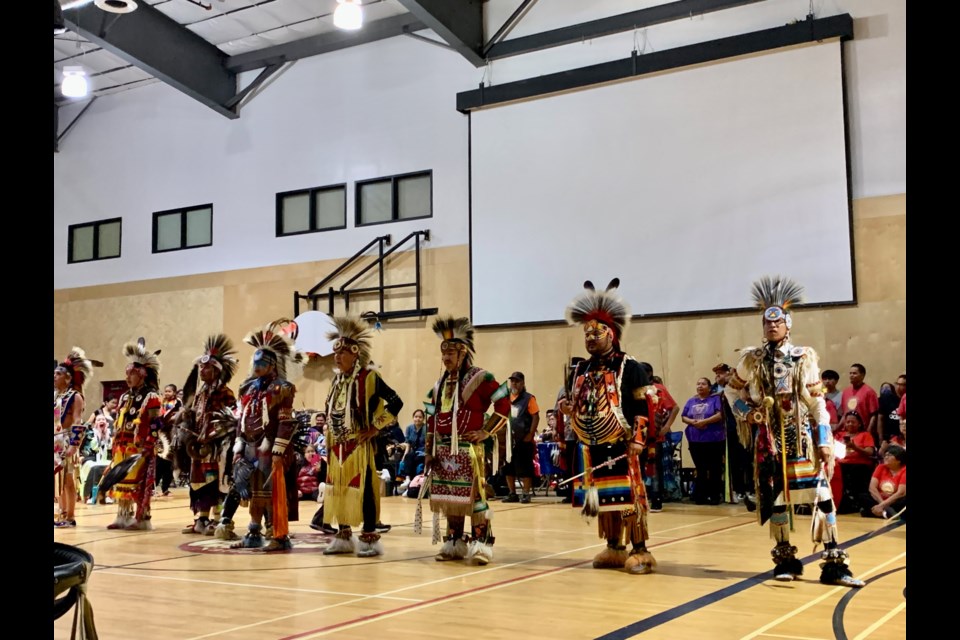Over the first weekend of June, hundreds of people came together at the U’ll’us Community Complex in Mount Currie to dance and celebrate together in person at the first Lil’wat Nation powwow since the pandemic cancelled the annual event two years ago.
Between June 3 and 5, dancers came from across the province to perform in front of a crowd dressed in full regalia, with prize money given out to the best dancers.
For Maureen Andy (Sawa7a), the Lil’wat powwow has a special place in her heart. Her small business Eye-nez Healingtouch sponsored the men’s prairie chicken dance with a $1,000 prize in memory of her late husband, George Abbott, who helped bring the powwow to Lil’wat Nation in the 1980s.
Abbott helped start the Vancouver Friendship Centre, as well as the Lillooet and Lil’wat powwows between the 1970s and 1980s, Andy said.
“When we moved here to Lil’wat, in 1984, he started the powwow here, and it’s been ongoing ever since,” she said.
The Lil’wat and the Stl’atl’imx people held their traditional dances and community gatherings for hundreds of years, long before European powers claimed and settled the territory.
Between 1885 and 1951, cultural gatherings were banned across Canada under Section 149 of the Indian Act. This became known as the Potlatch Ban. First Nations people found participating in potlatches or powwows could be sentenced to up to two months in jail for first offenders and three months for second offenders.
After the ban was ended in 1952, there was a movement from First Nations youth who wanted to rejuvenate the cultural tradition and bring back the dancing celebration.
“Any of our cultural ways were banned, and we could be either jailed or shot, so we were doing it underground,” said Andy.
“We were just part of the spiritual reawakening—the spiritual revolution that was going along ... if you’ve read any of our histories, all of that was ripped away, and hidden and taken away, so it had to be re-energized.”
Abbott first met Andy in 1975 during an armed blockade in Lil’wat territory. In 1975, the Department of Fisheries blocked some Lil’wat people from fishing on Lillooet Lake. This, along with other outstanding grievances, led the Nation to blockade a road in the area.
Abbott was a part of the Nlaka’pamux people. He danced as part of a group from the Daybreak Star Indian Cultural Centre in Seattle, Wash., with whom he travelled to Europe and won 1st place in 12 of 13 countries.
“So the Nlaka’pamux, the Thompson people, were our natural enemies in that time,” Andy said.
“It was 100 years since they made peace. We made peace between our peoples. So he asked for my hand in marriage from my mother, Marie Leo. She agreed, and then he came to talk to me, and I agreed.”
For Andy, the prairie chicken dance is special, because that was the style of dance Abbott was the best at.
“He was a champion of that prairie chicken dance. He used to send the boys into the bush to study before they could dance because they had to know the moves of the bird. So that’s what the dancing is all about, and that’s what we’re looking for in the championship,” said Andy.
“The dancers [at this year’s powwow] were very beautiful, very powerful, very awesome, and they could tell that they hadn’t really known what it meant. When you do the prairie chicken dance, you go really low to the floor, like your wings are touching the floor, and then you raise your hackles and then your tail feathers and then your head so high.”
Andy’s son Eagle ended up choosing the winner, Stan Green Sr., an elder from the Lower Mainland.
Abbott passed away in 2012, “as a direct result” of the court disclosures concerning his abuse in the residential school system, Andy said.
“When he had to stand up in court and repeat and repeat and repeat, for two weeks, what had been done to him, it killed his spirit,” she said. “Then within a year, he was dead. So it was a terrible thing, and it’s a terrible truth that has happened to many of the ones that had to go to court for it.”
It was only fitting that Abbott’s life and memory were honoured at a powwow, an event so meaningful to him, where his real spirit was on full display.
“When he did the powwows ... he would get the food, he would get everything that was necessary. He’d always say, ‘do it with a good heart or not at all,’” Andy said.
“Everything was done with laughter and volunteering and making sure that people had their comfort and had their joy from all the dancing and all the blessings that went with it.”




